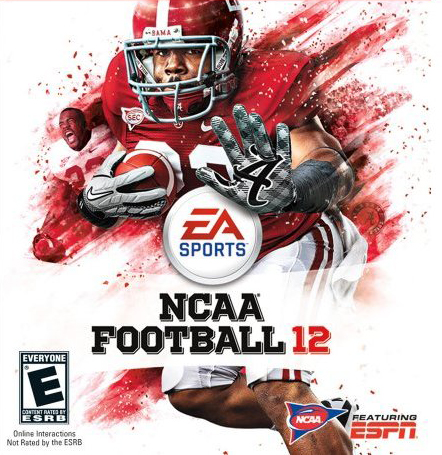The ability video game developers have to
create amazing and fantastical worlds and bring them to both, young and old
minds alike is nothing less than phenomenal. Of course it’s one thing when you
are creating something totally from scratch and coming up with every single
detail of the game yourself, and another when you are creating a game based on,
whether loosely or fully, on reality. Both of these types of creations have had
and still have legal issues they must face from time to time. At the heart of
most of the issues developers face usually tends to deal with intellectual
property in some way, shape, or form. Upcoming video game developers can take
note from some issues a giant in the industry has gone through and continues to
go through certain legal challenges.
 |
| Cover for EA Sports' NCAA Football 2012 |
That
giant is none other than mega publisher Electronic Arts (EA). Electronic Arts
has been on both ends of the legal table when it comes to intellectual
property. First up, with EA’s largest development department, EA Sports, they
have found a lot of success with their gaming franchises from college football
to world club soccer. Now here is a game that is clearly based on reality, and
with that reality comes likeness and characteristics of real sports players.
The problem comes when EA does not have the permission to depict certain
players within their games. The best example can be shown through an article
released by the Los
Angeles County Bar Association in May of 2011. The article addresses EA’s
NCAA Football franchise and the use of accurate “likeness” and characteristics
that look eerily similar to their real-life counterparts; all of which, due to
NCAA rules, cannot profit from endorsing said video games. In a nutshell, EA
argues that without using a player’s actual face or name they are protected
under the First Amendment to produce their game. In the end, at least in one of
the many suits, a New
Jersey judge ruled in favor of EA stating that since the US Supreme Court
found games to be protected under the First Amendment, in this specific case they
did too.
 |
| EA/Dice Battlefield 3 Image |
Another
issue EA faced this last year, dealt with their blockbuster-hit game Battlefield 3. According to two separate
posts by experts working at Davis LLP, EA has had to “preemptively”
sue a helicopter manufacturer after talks about acquiring rights to their
helicopters for use in the video game fell through. The second post furthers
the insight towards this case by stating that EA’s preemptive suit is based on nominative
fair use grounds. This issue is very interesting for developers because it
can ultimately open a floodgate to future lawsuits should EA fail. To make my
point clearer, the way I see it is that everyone’s perception of an attack
helicopter is mostly limited to what we have viewed in pictures or any previous
knowledge we may have of them or whatnot. I guess the best example I can give
is with the depiction of generic flat-screen TVs within the stories of video
games. I am sure there is at least one TV making company out there that can
argue that one of their designs has been depicted in a video game. Maybe even a
damaged flat-screen on the floor of one of those battle maps in Battlefield 3?
If there is one legal case any future game developer should keep on eye on, it
is this one.
 |
| Zynga's The Ville vs. EA's The Sims Social |
The
last issue we find EA on the other side of the legal table, with their suit
brought against social gaming company Zynga. EA argues that Zynga’s The Ville is eerily similar to EA’s own
social game called The Sims Social.
Within the Times
Live article, they quote an expert saying that copying, with respect to
what companies offer their customers in choices and products within a game, has
been growing in the social gaming arena for years now. For both of these companies this suit is just
another day of doing business within this industry. Intellectual property is
their breadwinner, they both need to take care of their IPs and try everything
that they can from others profiting from their hard-earned creations. From a
future video game developer’s perspective, protecting our IPs is something that
we will all need to learn to take care of. Our IPs will be and should be our
number one priority outside of creating them. Of course, it should also be
said, that respecting others’ IPs should be dealt with due diligence prior to
publishing any final product and practiced more often than not.
As
always, we here at Pencils and Vectors, love to hear your thoughts and takes on
the issues and stories we present. What is your take on one or all of EA’s
issues? Are there any cases or instances that mirror those of EAs that you know
about? We look forward to read your comments!
No comments:
Post a Comment